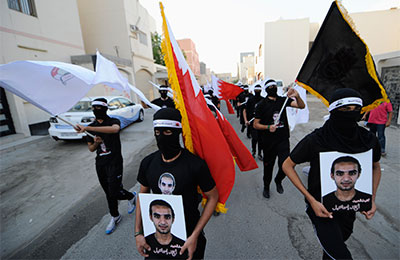On the night he was shot, Ahmed Ismail Hassan al Samadi was working. Protestors had gathered along a highway near his home in a small Bahraini village. With his handheld camcorder, Ahmed filmed as they marched. He filmed as security forces arrived in marked and unmarked cars. The citizen journalist had tens of hours of footage of scenes just like this from a year of ongoing demonstrations that began at the height of the Arab Spring. With one bullet, his filming came to an end.
There are plenty of rumors and theories about what happened on that night, March 30, 2012–about who shot Ahmed. But as this week marks the 18-month anniversary of Ahmed’s death, his family is still no closer to justice. There are no announced suspects in the case, nor has the family been contacted with any news about an investigation.
In Bahrain, Ahmed’s case is both unique and alarmingly common. His killing stands out as brutal: a live bullet, a young victim. His life wasn’t taken accidentally, and the assailant may have been a civilian.
But in seeking justice, Ahmed’s family has shared the frustrations of many in the opposition, who say their cases are not treated with seriousness. And meanwhile, citizen journalists similar to Ahmed have continued to find themselves under particular scrutiny for their work documenting unrest.
Ahmed’s story began in 2011, a year before his death. The 22-year-old store clerk, a meditative, calm young man, was energized to take to the streets when Arab Spring-inspired protests erupted in Bahrain in 2011. He turned his camera–once used to photograph his family and friends–toward the demonstrators in the streets, and soon, the security forces who dispersed them. He meticulously documented the uprising’s moments of exultation and despair. By friends and families’ accounts, he never lost hope–even as clashes turned violent. He saw friends wounded or killed, and hundreds went to jail.
Just hours after Ahmed was shot, his family hit their first barrier in a quest for justice. Although the medical examiner’s report had listed his cause of death as a gunshot wound, his death certificate–the document needed to open a police investigation–mentioned nothing about a bullet. For two weeks, the family fought to correct the error, refusing to accept Ahmed’s body for burial–even though religious custom mandated a funeral as soon as possible. They never received the correction.
Several witnesses were called for questioning in the case, but they later said in interviews that the interrogations focused not on Ahmed’s assailant but on the whereabouts of the camera he used to film that night.
If his family has given up on justice in court, they have not given up on their son’s aspirations. Ahmed’s father, Ismail Moussa, has taken over as the cameraman at many neighborhood protests. Holding a photo of his son, and Ahmed’s old camera, he documents the ongoing demonstrations that dot the island. But last week, he was detained and is currently being held for 15 days while police investigate him for illegal gathering, his family said, adding that his health is poor and he is exhausted.
Ismail Moussa, his son’s protégé, joins other citizen journalists who have been detained for their work filming, documenting, and sharing coverage of unrest in Bahrain.
Two of the most prominent detainees include blogger Mohammed Hassan and photographer Hussein Hubail. Hassan is a young liberal, famous in Bahrain for his blog and Twitter accounts–as well as his pragmatism toward solving Bahrain’s conflict. He had helped international journalists including CBS’s Dan Rather, who filmed a documentary on Bahrain in the early days of the uprising. But in early 2013, he stopped his writing and blogging, having been previously arrested and questioned about his international contacts.
On August 21, Hassan and Hubail were charged with contributing to social media accounts inciting hatred against the regime. They are accused of links to the Youth Coalition of the Revolution of February 14, an opposition movement that encourages civil disobedience, as well as more hardened tactics such as tire burning and Molotov cocktails. Hassan said he was tortured in custody and confessed under duress. When his lawyer tweeted about his case in August, he too was detained.
Meanwhile, the mystery of Ahmed’s death remains just that. The family’s lawyer, Mohammed Al Tajer, put it to me this way: “It’s a good thing that they haven’t decided, like other cases, to simply announce that it’s a closed file … Most victims’ families never know who the killer is.”
